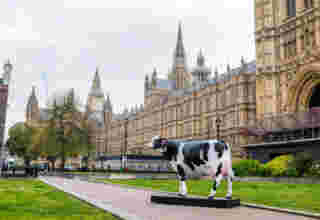British households have reduced their energy spend by an average of £22 a month by making simple changes since the price cap rise in April, such as leaving hair to dry naturally, switching devices off at the socket – and limiting use of the tumble dryer.
A study of 5,000 adults found 28 per cent say this is the first summer they’ve made attempts to reduce their energy use.
These attempts include turning unused lights off (49 per cent), switching devices off at the socket (39 per cent) and disconnecting phone chargers at the mains (37 per cent).
As well as hanging washing outside as opposed to using a dryer (38 per cent) and letting their hair dry naturally instead of using a hairdryer (26 per cent).
For those who have adjusted their energy habits for summer, bills have been reduced by an average of £22.09 a month.
And of those surveyed who have seen a reduction in their bills, the number of people with a smart meter was 23 per cent higher than those without one installed.
The monthly financial saving over the course of the year would amount to almost £270.
The research was commissioned by Smart Energy GB, to inform its Super Smart Energy Savers Report, which is co-authored with consumer advocates Dominic Littlewood, Helen Skelton and MoneyMagpie.
Energy conscious
TV presenter Dominic Littlewood and Smart Energy GB have also launched a new online mini-series, What’s Watt, tracking three families across the UK as they take steps to reduce their energy use.
Dominic Littlewood said: “Visiting homes across Great Britain was an eye opener.
“It’s clear that people have become more energy conscious – even though sometimes it’s one member of the household leading the change.
“Whilst many people are taking lots of positive steps to manage their energy use, by working directly with families we found we
-
Tech-savvy Gen Alpha children tend to choose screen time over spending quality time with their families during weekends and their free time from school.
May 21, 2024. Most families these days do not spend enough quality time together, due to t… -
ROSEY DAVIDSON, EXPERT SLEEP CONSULTANT & JUST CHILL BABY SLEEP FOUNDER, ANNOUNCES IT’S TIME FOR BED: THE PERFECT BEDTIME BOOK TO HELP LITTLE ONES DRIFT OFF TO SLEEP
Expert sleep consultant Rosey Davidson has announced the upcoming picture book It’s Time F… -
Vale of Rheidol Railway Festival of Steam – August Bank Holiday weekend
The Vale of Rheidol Railway is hosting a Festival of a Steam this coming August Bank Holid…
Load More Related Articles
-
Top 18 activities those with a physical condition struggle to do – including sleep
Millions of Brits are unable to exercise, sleep or endure long journeys in the car … -
Reimagined fairy tales – as read by comedian Ellie Taylor
Classic fairy tales have been reimagined to see Goldilocks finally get her comeuppance, Ja… -
Top 30 things over 65s do to maintain independence – including gardening
Retirees are determined to maintain their independence in later life, by dressing how they…
Load More By Entertain The Kids
-
Brits are using more than twice as much water than they realise in their homes
Brits are using more than twice as much water than they realise when showering, flushing t… -
Budding innovators win competition for designing apps that tackle substance abuse and plastic pollution
Two budding innovators have designed applications for voice-controlled devices to help tac… -
Life-size 'cow lamp' appeared in front of the Houses of Parliament
A life-size ‘cow lamp’ has appeared in front of the Houses of Parliament &ndas…
Load More In Environment
Comments are closed.
Check Also
Top 18 activities those with a physical condition struggle to do – including sleep
Millions of Brits are unable to exercise, sleep or endure long journeys in the car …





















